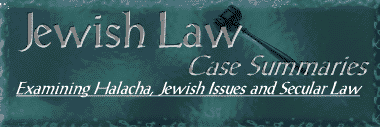

Jewish Law
Case Summaries
-- Beards
- Geller v. Secretary of Defense
-
423 F. Supp. 16 (D. D.C. 1976)
- After wearing beard for seven years without problem, USAF Chaplain
told to remove it. Held, in these unique circumstances Chaplain
could keep beard since he had worn it for so long and he was
specifically hired by Air Force to provide religious service.
- After wearing beard for seven years without problem, USAF Chaplain
told to remove it. Held, in these unique circumstances Chaplain
could keep beard since he had worn it for so long and he was
specifically hired by Air Force to provide religious service.
- Moskowitz v. Wilkonson
-
432 F. Supp. 941 (D. Conn. 1977)
- Prison regulation on beards unconstitutional.
- Prison regulation on beards unconstitutional.
- Fromer v. Scully
-
874 F.2d 69 (2nd Cir. 1989)
- Regulation limiting size of beard upheld; plaintiff could still
practice religion freely.
- Regulation limiting size of beard upheld; plaintiff could still
practice religion freely.
- Friedman v. State of Arizona
-
912 F.2d 328 (9th Cir. 1990)
- Prison regulation prohibiting facial hair not unconstitutional in
light of a legitimate state interest (e.g., being able to post
pictures of escaped convicts, having guards easily ID inmates, etc.)
- Prison regulation prohibiting facial hair not unconstitutional in
light of a legitimate state interest (e.g., being able to post
pictures of escaped convicts, having guards easily ID inmates, etc.)
- See generally EEOC v UPS
-
94 F.3d 314 (9th Cir. 1996)
- No beards rule being discriminatory.
- No beards rule being discriminatory.
- Police Newark Lodge No. 12 v. City of Newark
-
170 F.3d 359 (3d Cir. 1999)
- A police department rule prohibiting the wearing of beards which makes allowance for exemptions for medical reasons but not for officers whose religious beliefs prohibit them from shaving their beards is subject to strict scrutiny; rule held to violate the free exercise clause of the First Amendment
- A police department rule prohibiting the wearing of beards which makes allowance for exemptions for medical reasons but not for officers whose religious beliefs prohibit them from shaving their beards is subject to strict scrutiny; rule held to violate the free exercise clause of the First Amendment
- Sadruddin v. City of Newark
-
34 F. Supp. 2d 923 (D. N.J. 1999)
- Muslim firefighter stated prima facie case of religious discrimination when he alleged that he was fired for refusing, on religious grounds, to comply with the department's no-beard policy; court rejected argument that any claim of discrimination should be dismissed as time-barred under 42 U.S.C. ' 2000e-5(e)(1) and (f)(1), which require that a complaint be filed with the court within 300 days after occurrence of the alleged unlawful employment practice and within 90 days of receipt of a right-to-sue letter from the EEOC.
- Umar v. Scott
-
991 S.W.2d 512 (Tex. App. 1999), No. 2-98-203-CV. Dated May 13, 1999. Opinion by J. William Brigham.
- Prison policy of not allowing inmates to grow beards, except for legitimate medical reasons, along with policy of not allowing closed custody inmates to attend congregational religious services or religious classes together, did not violate Muslim prisoner's free exercise rights and equal protection rights under the U.S. Constitution, the Texas Government Code, or the Texas Constitution; prison officials entitled to qualified and official immunity.
- Prison policy of not allowing inmates to grow beards, except for legitimate medical reasons, along with policy of not allowing closed custody inmates to attend congregational religious services or religious classes together, did not violate Muslim prisoner's free exercise rights and equal protection rights under the U.S. Constitution, the Texas Government Code, or the Texas Constitution; prison officials entitled to qualified and official immunity.
Copyright © 1997-2008 by Ira Kasdan. All rights reserved.
DISCLAIMER